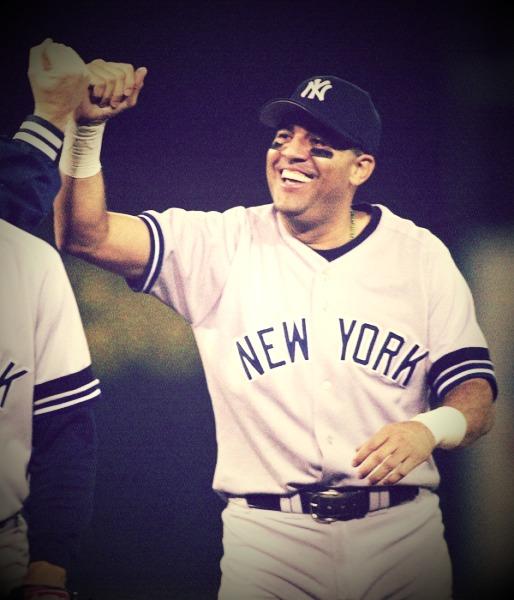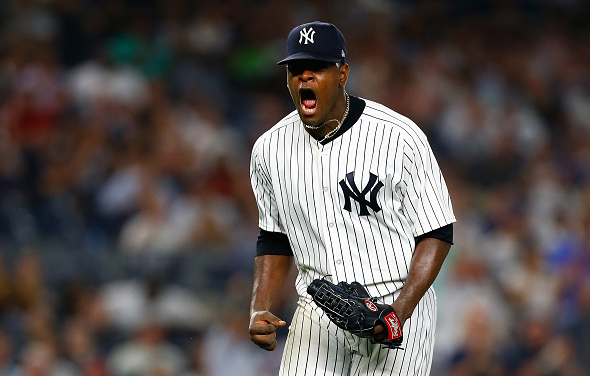
Luis Sojo began his Major League career with the Toronto Blue Jays in 1990. After a stop in California, a return trip to Toronto, and a stint in Seattle, Sojo was traded to the Yanks in August of 1996. The timing was nothing short of fortuitous as two months later he would be fitted for a World Series ring, his first of four in New York. In the ’96 ALDS he did not have a single at bat and in the ALCS was mostly used as a defensive replacement and a pinch runner, but in the World Series he went 3-for-5 with a double and an RBI as the Yanks overcame an 0-2 deficit vs. Atlanta.
Over the next 3 seasons Sojo would see his playing time fluctuate, but filling defensive holes and digging in for key at bats on a championship team was enough for him. The consummate role player, he could always be relied upon to take on a needed role, often an unsung one, for the betterment of the club. He was rewarded with two more rings in 1998 and 1999.
After being released by the Yanks in November of 1999 Sojo signed with the Pirates, but was traded back to the Yankees in August where he hit .288 in 34 games, earning a spot on the postseason roster. He played in all 5 games of the ALDS and all 6 games of the ALCS, but saved his best for the Fall Classic. After a career of being a role player, Sojo got a chance to play the hero in the clinching Game 5 of the Subway Series. Locked in a 2-2 game in the top of the 9th inning, Sojo came up with 2 outs and men on first and second. On the first pitch he saw from Al Leiter he sent a single into center field that scored Scott Brosius and Jorge Posada to give the Yanks their 4th championship in 5 years.
Sojo stayed on for the 2001 season, but after failing to earn a spot in 2002 he retired and accepted a manager position for the Norwich Navigators, a Yankee double-A affiliate, leading them to an Eastern League title. In 2003 he attended his first Old-Timers’ Day at the Stadium where he hit a game-winning home run off of Ron Guidry. In a strange twist, Sojo may have become the first Yankee to play in an Old-Timers’ game and then re-join the team when he appeared in 3 games near the end of the season. He retired for good after the ’03 season, but remained with the Yankees as a third base coach from 2004 to 2005. In 2011 he became the manager of the single-A Tampa Yankees, a post he continues to hold.
Sojo is remembered as a player with an infectious smile, a true grit, and a deep desire to do anything for his team. For those reasons and others he remains a fan favorite in New York. He was gracious enough to take some time out of his busy schedule to answer a few of my questions.
* * * * *
You began your career with Toronto, then moved to California and Seattle before coming to New York. What did it mean to you to become a Yankee?
It was a dream come true to be honest. Playing in the Big Leagues, it’s something every player wants to do. Just the history of the Yankees and the tradition… They picked me up late in the season and my wife was crying saying, ‘Do we have to go to New York?’ So I went ahead for a month and told her she didn’t know what she was missing. I loved it. It was very special.
The ’96 team remains one of the most beloved in Yankee history. People forget how much they had to overcome: a controversial coaching change, a slew of injuries, an 0-2 deficit in the World Series. What made that team so resilient?
Chemistry. As a player when you understand your role the team is stronger. Guys like Tim Raines, Charlie Hayes, and Darryl Strawberry were used to playing every day, but accepted their roles because they just wanted to win. That whole team knew their roles and wanted to win. We also believed in ourselves and knew what it took to win. The unity and chemistry on that team was amazing.
You were the hero of the clincher in the 2000 World Series. After you singled in Posada and Brosius, what went through your mind?
My dad. He passed away the year before. In the first game of that World Series I came up with the bases loaded and 1 out and popped up to the catcher. God gave me another opportunity. I was running to first with tears in my eyes after getting the hit. The year before I had wanted to retire, but it was my dad who told me to stay with it because he knew I loved the game.
You batted .400 in 12 career World Series games. What allowed you to come through when the lights were brightest?
I think as a player you’ve got to prepare. I was not a superstar, but I could come through in those particular times. Other players trusted me and believed in me even though I didn’t play every day. I was physically and mentally ready it and came through. But I didn’t know that. I batted .400 in the World Series? [Laughs]
Yeah, man! You need to check your Baseball Reference page more often!
I guess I do! [Laughs]
I remember Joe Torre came up to me during spring training in ’98. He told me he didn’t know how I was going to do in April, but he wanted to make sure I would be ready for whenever he needed me. Scott Brosius was new that season, and Derek Jeter and Chuck Knoblauch would need a rest from time to time. I told him when he needed me I was going to be ready. He was also preparing me mentally for the playoffs. As a player you need to know your role. Even though you don’t play every day, you’re still an important part of the team because you never know what’s going to happen. God blessed me.
Who were you closest with on the team and why?
Jeter, Jorge Posada, Tino Martinez, Mariano Rivera, Bernie Williams… we were always talking. We had such a good time together because they all really enjoyed the game. We played the game hard and believed in each other.
What do you miss most about playing in New York?
The fans. They really push you. If you don’t perform they’ll let you know and they appreciate you when you do. I love that. When they boo it doesn’t mean they don’t like you, they just want you to produce.
What is your funniest memory from your time in pinstripes?
[Laughs] Well, a lot of people remember my trip.
I knew you were going to say that!
[Background: In Game 5 of the 2000 ALDS Sojo fielded a routine grounder, but as he took a step to throw to 1st base he stepped on his own foot and fell over, allowing the runner to reach safely.]
I knew you were waiting for me to say it. [Laughs] We were playing the A’s in Game 5. We couldn’t beat them that year. After I tripped we all met at the mound. Torre was serious, as always. Andy Pettitte was screaming, ‘How can this happen? How can this happen to me?’ I said, “It didn’t happen to you, it happened to ME!” Tino and Jeter were laughing so hard they were crying. When I got back to the dugout Don Zimmer said, ‘I’m old and have bad knees and I still wouldn’t do that!’ The entire team burst out laughing. From there we loosened up and went on to win the game and the series. It was a turning point.
You played under one of the greatest managers of all-time in Joe Torre. How have you drawn on your experience under him in your management of the Tampa Yankees?
Torre was the best manager I ever had. He was always giving advice and told me one day that I would be a good manager. He told me I communicated well with players and people. I was always one of the guys that wanted to learn about the game and he taught me so much. Zimmer was always asking me questions about baseball and always told me that after 50 years in baseball he was still learning something every day. Now I teach guys to use their heads and play the game hard. I learned all of that from them.
Who are you looking at to make an impact in Tampa this year and on the Yankees in the future?
Gary Sanchez for one.
Well he had two bombs last night.
He had a great game last night. He still has a long way to go but down the road he’ll be okay. He’s only 20 years old and is still learning how to play the game. Mason Williams is a great talent. This game can be frustrating and he’ll learn how to work his way through that. Ben Gamel is very professional. He plays hard and can be a very special player in the future.
What has been the most rewarding part of being a manager?
I enjoy seeing guys getting better. As coaches we are here to teach. There is a lot of pressure in single A and I try to eliminate that, telling my guys not to worry about the result, but to play hard and learn the game. I try to eliminate the constant pressure of being released. It’s hard because at this level you need to be a psychologist, teacher, father, uncle. But it’s satisfying. I have a great time. My goal is to get back to the Bigs, but I love what I’m doing.
* * * * *
Follow Dan on Twitter @161st_and_River



